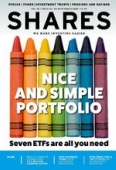Archived article
Please note that tax, investment, pension and ISA rules can change and the information and any views contained in this article may now be inaccurate.
Beauty website owner prepares for biggest London listing of 2020

Online retail firm The Hut Group, the Manchester-based owner of the Lookfantastic website, is to raise £920 million in a stock market listing, valuing the business at £4.5 billion.
The planned share offering would be the biggest this year on the London market and the first since the coronavirus pandemic, though in our view, there are several red flags around this offering.
Hut Group, whose other brands include sports nutrition firm Myprotein, owns its own websites, warehouses and delivery network, and licenses its Ingenuity e-commerce fulfilment technology to multinational consumer giants such as Johnson & Johnson, Nestle and Procter & Gamble.
Since 2004 the firm has accumulated around a dozen prestige lifestyle brands, marketing them through its global network of 200 websites. It also owns a members-only health spa in Cheshire and three Manchester hotels.
Despite generating sales of £1.1 billion in 2019, like most platform businesses Hut Group invests heavily in order to grow and net losses for the year were £48 million.
Cumulative net losses from the start of 2017 to June 2020 were £113 million and the prospectus warns the company ‘may continue to incur significant losses in future periods’.
The founder, Matthew Moulding, owns 25.7% of the shares while private equity behemoth KKR owns 14.4% and investment trust Merian Chrysalis (MER) holds an 8.8% stake.
Under the terms of the placing, Moulding is entitled to a £700 million payout if the company’s market value reaches £7.25 billion in two years’ time.
Basing executive compensation on the firm’s market value is risky as it can encourage management to make value-destructive acquisitions to meet its targets.
Also, Moulding has a founder share which allows him to veto unwanted takeover approaches, but which also blocks the stock from joining the FTSE indices.
In addition, the free float is too small for admission to the Main Market, meaning the shares will be consigned to the Standard Listing backwaters where governance and liquidity are reduced.
Spending on marketing, including search engine optimisation and social media campaigns, is significant in order to generate traffic to the firm’s websites, hence it makes a loss. Spending on raw materials is also significant and subject to price fluctuations.
Finally, given it made an EBITDA (earnings before interest, tax, depreciation and amortisatio n) margin of roughly 10% last year – about the same as building products group Grafton (GFTU) – the implied valuation of £4.5 billion looks demanding and seems to be based on the potential future value of the Ingenuity business, which contributed less than 10% of revenues last year and which grew its turnover by less than 1% in the first half of this year.
Savvy investors may want to see more evidence of consistent execution as a public company before risking their money. Avoid for now.
Important information:
These articles are provided by Shares magazine which is published by AJ Bell Media, a part of AJ Bell. Shares is not written by AJ Bell.
Shares is provided for your general information and use and is not a personal recommendation to invest. It is not intended to be relied upon by you in making or not making any investment decisions. The investments referred to in these articles will not be suitable for all investors. If in doubt please seek appropriate independent financial advice.
Investors acting on the information in these articles do so at their own risk and AJ Bell Media and its staff do not accept liability for losses suffered by investors as a result of their investment decisions.
Issue contents
Editor's View
Feature
First-time Investor
Great Ideas
Money Matters
News
- Saga white knight welcomed by investors
- SDL’s tie-up with RWS offers a compelling story
- Shock resignation of Japan PM hits Nikkei
- US markets flash warning signs with echoes of past corrections
- US Federal Reserve tweaks monetary policy goals
- Beauty website owner prepares for biggest London listing of 2020

 magazine
magazine








